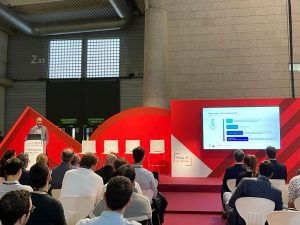- EIT Urban Mobility’s latest study about Mobility Data Spaces in the Spanish ecosystem was presented during the Tomorrow.Mobility World Congress organised last week in Barcelona.
- The study has been developed by Fundació i2CAT, Factual Consulting and EIT Urban Mobility.
- The presentation of the study was followed by a Workshop of the Mobility Working Group of Gaia-X España and a High-level session, ‘The Future of Mobility Data Spaces’ with experts from across Europe.
The city of Barcelona hosted, last week, the Tomorrow.Mobility World Congress event. Focused on promoting the design and adoption of new sustainable urban mobility models and jointly organised with the Smart City Expo World Congress, the event presents itself as the world’s most significant meeting point for urban innovation. More than 40000 delegates from around the globe attended this year’s edition.
In this edition, EIT Urban Mobility’s latest study on Mobility Data Spaces was unveiled during a session hosted at the Innovation Stage, where the study’s co-authors presented its main conclusions.
The study explores the incentives and barriers of key actors of future data spaces, including transport authorities, operators, urban planners, MaaS providers, logistics providers, OEMs, and infrastructure operators. The study also examines levers and replicable use cases that can unlock public-private investment and inspire the accelerated development and uptake of mobility data spaces.
These are some of the main takeaways we learnt from the high-level panel of experts we brought together in the Innovation Stage:
“Data Spaces present a fresh value proposition for mobility data and its value chains, creating secure datasharing ecosystems that provide greatly improved usage control over one’s data, allowing new models and services across more interconnected environments. At this regard, research institutions play a key role in lowering the barriers to entry: tech demonstrations, pilots, experimentation, deployment, and operation.” Jim Ahtes, Fundació i2Cat
“Organisations – both private and public – need incentives and help to join forces and overcome obstacles and barriers (data sharing concerns, viable business models, governance issues, etc.)” Carme Fàbregas, ATM.
“The MobilityData Space initiative in Germany has helped us to demystify some of the more spread data sharing concerns, bring together the key stakeholders of mobility value chain to co-design & develop use cases, and quickly experiment with Data Spaces” Lucie Kirstein, ACATECH
“There is no need to reinvent the wheel, but some level of convergence is needed among the different European DataSpaces initiatives (such as IDSA, Gaia-X, FIWARE, etc.), while maintaining alternative technological solutions”, Josep Laborda, FACTUAL.


The session was leaded and moderated by Daniel Serra, EIT Urban Mobility Ecosystem & Stakeholders Director and member of the Spanish Hub of Gaia-X.
About the study
Download the study The potential of Mobility Data Spaces DS Mobility Study 2023.03.13b
Data drives the mobility of the future and is an indispensable strategic asset to support critical needs such as improved safety and sustainability, future transport modes such as seamless multimodal travel and autonomous vehicles deployed on a large scale. This is recognised as a key component of the European Strategy for Sustainable and Intelligent Mobility. The flow of this data is critical. But to achieve this vision, the availability and accessibility of this data, the trusted environments to share it securely and to evolve the interoperability and common standards of these exchanges at technical, organisational and legal levels must be prioritised.
In Mobility, and as well as in other sectors, data spaces will enable new public and commercial models and services by ensuring widespread availability of data while respecting personal data protection and new regulations such as the Data Governance Act and Data Act.
Some European initiatives are already in place to define the strategy for Mobility Data Spaces. The idea is not to have a single set of solutions and tools, but a common framework that allows a choice of interoperable approaches. There are related initiatives at the national level, such as the new Gaia-X Spain.
The study presents the building blocks for Spain’s mobility data spaces, including key technical architectures, components, and tools to contribute to the development of mobility data spaces; high-value datasets from public mobility authorities and administrations that can fuel data spaces; and proprietary data sources that are critical to enabling future use cases.
Download the study The potential of Mobility Data Spaces DS Mobility Study 2023.03.13b
(Spanish version v1.1) here.
